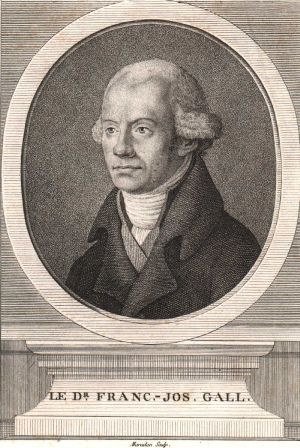Franz Joseph Gall
Franz Joseph Gall (March 9, 1758 - August 22, 1828) was a neuroanatomist and physiologist who was a pioneer in the study of the localization of mental functions in the brain.
Gall was born in Grand Duchy of Baden, in the village of Tiefenbronn. As the second eldest son, he was intended for the priesthood but chose to study medicine in Vienna, Austria instead. Around 1800, he developed "cranioscopy", a method to divine the personality and development of mental and moral faculties on the basis of the external shape of the skull. Cranioscopy («cranium»: skull, «scopos»: vision) was later renamed to phrenology («phrenos»: mind, «logos»: study) by his follower Johann Spurzheim.
With his revolutionary concepts on brain localization, Gall offended religious leaders and scientists alike. The Catholic Church considered his theory as contrary to religion (that the mind, created by God, should have a physical seat in brain matter, was anathema). Established science also condemned these ideas for lack of scientific proof of his theory. Due to this, Gall, who worked and lectured in Vienna, Austria, left. His ideas were not acceptable to the court of Franz Josef II (the brother of Marie Antoinette). He sought a teaching position in Germany and eventually settled in Paris. Revolutionary France was most likely the most hospitable place for Gall's theories. However, Napoleon Bonaparte, the ruling emperor, and the scientific establishment, led by the Institute of France, pronounced his science as invalid. Despite all this, Gall was able to secure a comfortable existence on the basis of his specialty. Gall became a celebrity of sorts as he was accepted into Parisian intellectual salons.
Gall's phrenological theories and practices were best accepted in England, where the ruling class used it to justify the "inferiority" of its colonial subjects, including the Irish, and then in the USA, where it became very popular from 1820 to 1850. The misuse of Gall's ideas and work to justify discrimination were deliberately furthered by his associates, including J.C. Spurzheim. Later, others tried to improve on his theories with systems such as characterology.
However, Gall made significant contributions to neurological science. Emotions were not located in the heart but in the brain and certain parts of the brain controlled certain emotions and actions. At the time these were revolutionary ideas. The opposition to Gall's ideas can be compared to the earlier opposition of Galileo's theory that the earth revolved around the sun. Gall's concept that brain function was localized proved to be correct.
Gall died in Paris, on August 22, 1828. Although married he had no direct decendents. However, direct descendents of his brothers lived in Germany until 1949.
Source
Phrenology, the History of Brain Localization
By: Renato M.E. Sabbatini, PhD
In: Brain & Mind, March 1997.
Reproduced with permission.
very useful information-http://pages.britishlibrary.net/phrenology/fjgall.html
Credits
New World Encyclopedia writers and editors rewrote and completed the Wikipedia article in accordance with New World Encyclopedia standards. This article abides by terms of the Creative Commons CC-by-sa 3.0 License (CC-by-sa), which may be used and disseminated with proper attribution. Credit is due under the terms of this license that can reference both the New World Encyclopedia contributors and the selfless volunteer contributors of the Wikimedia Foundation. To cite this article click here for a list of acceptable citing formats.The history of earlier contributions by wikipedians is accessible to researchers here:
The history of this article since it was imported to New World Encyclopedia:
Note: Some restrictions may apply to use of individual images which are separately licensed.
